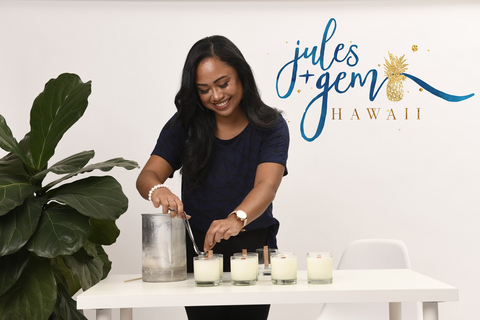
The foundation for Nāpili FLO Farm’s locally-crafted artisanal kimchi and fermented foods is embedded in family love and determination to create a business that benefits the land and community.
When founder Monica Bogar’s son Maddox was born in 2011, she decided to turn her family’s Lahaina property into a sustainable, organic urban farm.
“One of the biggest inspirations was to start a green business and stay home and raise my son,” Bogar says.
She decided to focus on vertical gardening and aquaponics, a sustainable hydroponics gardening system. These methods helped her grow more efficiently in small spaces beginning with microgreens.
“I was able to grow in a small area but still make the return,” Bogar says. “I built the greenhouse in my home. I just got really close with all of the chefs and food trucks and did business with them.”
During that time, Bogar’s mom moved in with her. Making kimchi and then selling it at the farmers market turned into a fun pastime for the mother-daughter duo.
“Kimchi was something we could do together,” Bogar says. “She was a serial entrepreneur. She wanted to go to the market. We started to go to the farmers market together.”
While she planned to build her business on the cold press juices she made with her microgreens. It was the kimchi that caught the community’s eye.
“I went in with the idea of doing cold-pressed juices but had to pivot because everyone was asking about kimchi,” Bogar says.
Bogar began making the kimchi recipe she learned from watching her mother, embellishing and building on it in some ways to create her renowned Napili FLO Organic Vegan Kimchi, Napili FLO Organic Pineapple Ginger Sauerkraut, and Napili FLO Probiotic GutShots.
Now, Nāpili FLO Farm holds awards for two of its products.
In 2020, Nāpili FLO Farm won two awards from the San Francisco-based Good Food Foundation for its Pineapple-Ginger-Turmeric Sauerkraut and Gut Shots, a probiotic elixir made from kimchi brine.
The majority of the ingredients in Bogar’s recipes are sourced from the islands.
“There are spices that we don't have here that I need to ship in,” she says. “My intention is to source from Maui and locally from Hawaii. “
For the items she does source, particularly her cabbage, she hopes to grow large enough that they become cash crops for the community where the farmers will be guaranteed to have an entity to sell the amounts they grow.
“When I was farming, I made sure everything I planted was sold before I planted,” she says. “I had to be efficient that way. I didn't have the space for extra growth, and it doesn't have a shelf life. Once the microgreens are ready, you have to cut it and sell it.”
Bogar’s current plans to expand her business include adding to her line of products.
“We’re looking forward to doing seasonal products and some other products we have lined up,” she says.
To add to its growth, Nāpili FLO Farm launched its online marketplace in the spring of 2020.
“That has increased our sales,” Bogar says. “It’s been a slow growth but has been a steady incline.”
As Nāpili FLO Farm grows, Bogar is committed to always create a product that doesn’t compromise her mission.
“I don't want to make money in spite of the earth,” she says. “Everything we do from beginning to end is super mindful and earth-conscious.”
Trying to eliminate waste, Bogar avoids using any bags and reuses cardboard boxes.
Bogar says she is passionate about making sure that mindfulness and love are incorporated when putting together Nāpili FLO Farm's recipes.
“We’re honing our craft,” Bogar says. “I really believe in high-vibrational foods. Knowing where the cabbage is coming, how they're growing it—all that kind of conscious living is involved in how we make our products and how we distribute our products.” Bogar says she wants customers to be able to feel that in her products.
“We need to make sure we have the most love when we make it,” Bogar says. “When someone is buying our product, that is what they are supporting.”







